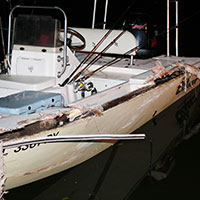 Why did state wait so long to bring charges in boating death?
Why did state wait so long to bring charges in boating death?
STORY BY LISA ZAHNER
Photo of the 17-foot Carolina Skiff boat that crashed into channel marker 149 in June 2017.
More than two and a half years after a tragic boating crash resulting in the June 2017 death of his friend Chance Riviero, 21-year-old Jayson Clark of southwest Vero was arrested on vessel homicide charges. What took so long to make an arrest is somewhat of a mystery.
Assistant State Attorney Brian Workman, the attorney prosecuting the case based upon an investigation by the Florida Fish and Wildlife Conservation Commission (FWC), said “vehicle fatality cases always take longer than other cases before being presented.
“This case required additional follow-up by the agency and review by experts before I could reach a charging decision,” Workman said. “The charge is well within the statute of limitations and I expect it to now proceed just as any other case.”
Vero-based defense attorney Andy Metcalf, who is representing Clark, said he’s worked a good number of cases involving a fatal crash and a state agency – typically the Florida Highway Patrol – and though the length of time can vary, two and a half years is more than twice as long as what he has experienced.
“I agree that it takes longer with a state agency investigating, but I’ve found that the average case that winds up charging a vehicular homicide is 10 months, or approaching a year a lot of times,” Metcalf said.
So the Jan. 2 arrest warrant for a second-degree felony charge of Vessel Homicide came as a bit of a surprise. “Who wouldn’t begin to feel like there’s nothing going to happen?” Metcalf said. “We didn’t expect charges to be filed.”
Clark was released from jail Jan. 3 on $15,000 bond.
“The tragedy of this is that it was a horrific accident and these boys were close friends. Not a day goes by that he doesn’t think about his friend and what happened,” Metcalf said on Clark’s behalf.
The FWC report completed Dec. 6, 2017 says that around 11 p.m. on Saturday, June 3, 2017, the 17-foot 2006 Carolina Skiff crashed into a green channel marker 149, after which Clark piloted the boat to Memorial Island.
“Mr. Clark stated they were coming back from Vero Beach. He stated that while traveling approximately 40 miles per hour just south of the 17th Street causeway, he noticed a channel marker at the last second but could not avoid it,” the report states.
At the time, Clark, then 19, held a valid operator’s license and had more than 100 hours of experience on the type of boat he was driving the night Riviero died after sustaining traumatic injuries to his head, plus broken bones and multiple internal injuries, according to the FWC report.
Riviero was ejected from the boat on impact. Four other passengers ranging in age from 18 to 23 were on board, among them 20-year-old Michael Ketcham of Vero Beach, who was also injured, sustaining broken ribs and internal injuries to his liver and spleen.
None of the boat’s occupants that night was wearing a life vest, though an inspection found two regulation life vests onboard. In addition to the death and injuries, the crash caused $8,500 damage to the boat. A pending civil suit filed against Clark by Riviero’s family has also been proceeding parallel to the criminal investigation.
Workman said the experts who were brought in were “toxicologists” as the initial investigation report from FWC filed in December 2017 cited states that Clark had “been drinking” and tested out at a blood alcohol content (BAC) as .08, which is the legal intoxication limit for both DUI and the boating version, BUI. Upon inspecting the boat, officers found “multiple empty beer cans, as well as a lighter next to a glass pipe containing residue, appearing to be paraphernalia.”
Metcalf said his client has not been charged with BUI. “It’s not an intoxication case in the case you’re talking about. It’s not an element in this case,” he said.
From a defense standpoint, Metcalf said it’s tougher to begin ramping up a case more than two years after the incident. “There’s not a whole lot I can do as long as they operate within the statute of limitations, but memories fade, people lose evidence and I don’t have subpoena power when there’s no active case,” Metcalf said. “Usually we can overcome it.”




